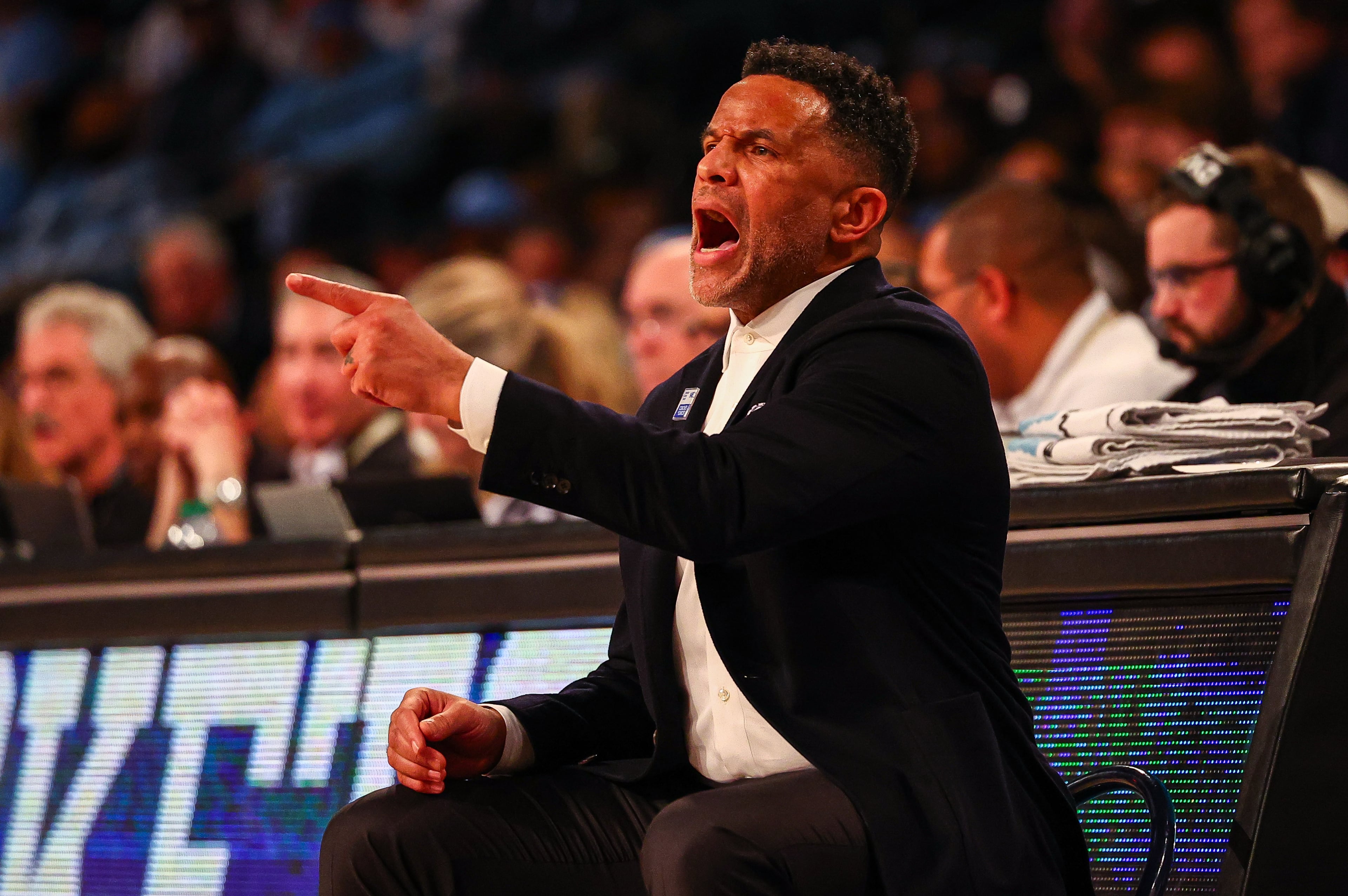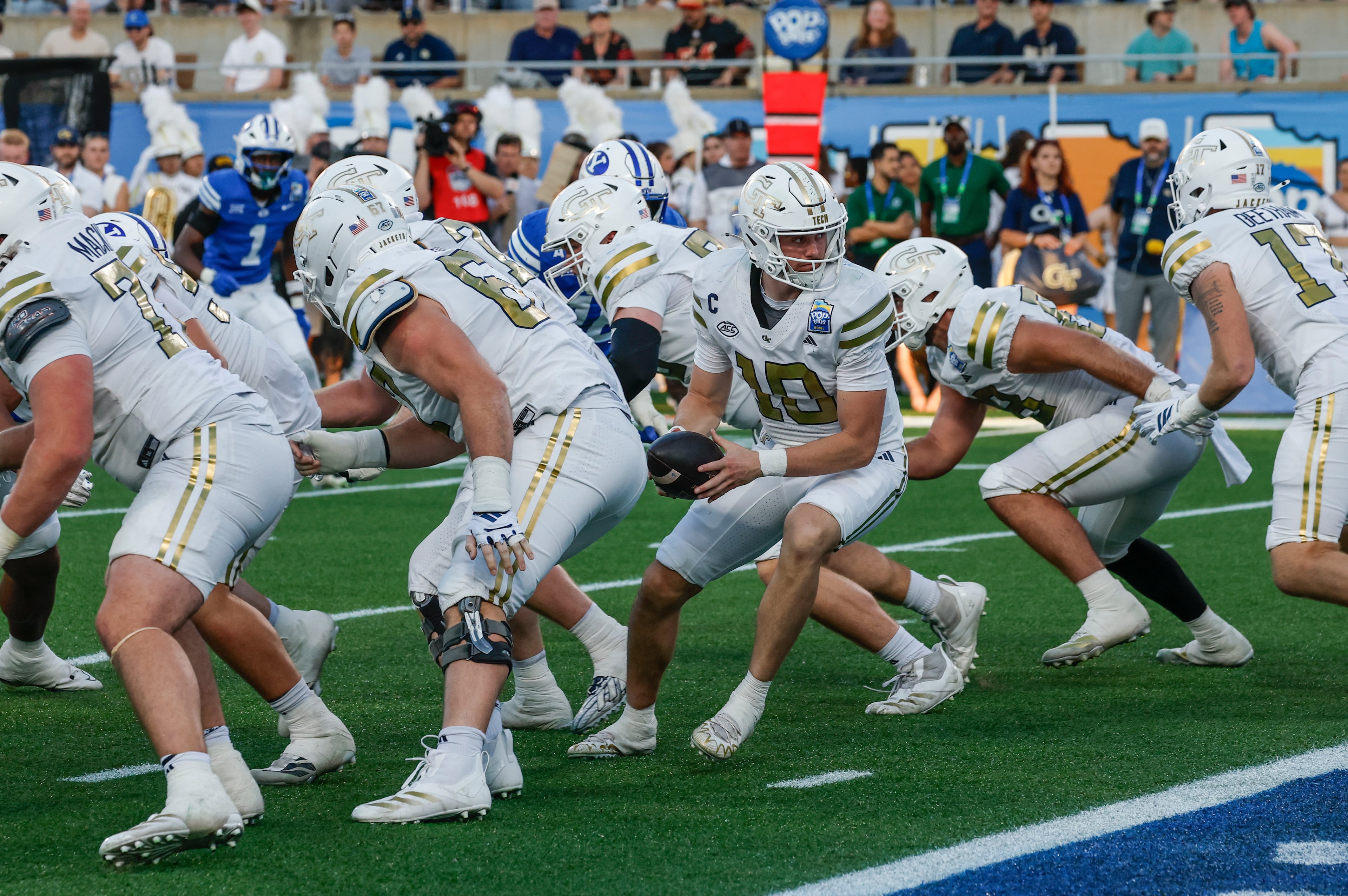Brent Key asserts ‘100% confidence’ in Georgia Tech offensive line

Georgia Tech offensive line coach Brent Key has put it out there. In his estimation, when the Yellow Jackets open their season Sept. 5 against No. 4 Clemson at Mercedes-Benz Stadium, his offensive linemen will be ready to pull their weight.
“When we put those five guys in the first game, and we have the adequate backups that we know we are going to play in that game, I have 100% confidence in those guys that we put on that field that we’re going to go to battle, and we’re going to win with this year,” Key said Monday following the Yellow Jackets’ eighth preseason practice.
Key may have been careful not to commit to a clear standard, such as a bowl game, but his belief that the offensive line can be a part of the solution in coach Geoff Collins’ fourth season is clear. Through three seasons, the line arguably has not been a net positive for various reasons, injuries among them. It is responsible in part for Collins’ record in his three seasons being 9-25. It’s also why heightened scrutiny rests upon Key. Hired from Alabama in January 2019, Key was celebrated as a home run, a coach who on top of being an accomplished recruiter with a track record for developing offensive linemen also was a proud Tech alum and a former team captain.
His value in Collins’ regime was recognized in him being the highest-paid assistant coach on the staff until Collins hired offensive coordinator Chip Long to replace Dave Patenaude in December. But in Collins and Key’s fourth season together, the demand for results has heightened.
Key’s group of linemen includes two players whom he inherited from former coach Paul Johnson, guard Michael Maye and walk-on interior lineman William Lay. The rest, including all players expected to start or be key backups, are players that he personally selected. He has had two seasons to develop four linemen who he recruited and one season to train two more. As the Jackets aim to lift themselves out of the ACC’s cellar, the success of this most critical position group (or lack of it) will reflect on Key’s capacity as a recruiter and developer of talent.
While the pool of experience is significantly lower than last season, Key asserted his confidence in his group, saying that the level of understanding of the scheme is greater.
“I think we’ve gotten to the point now where we’re understanding what to do much, much better than we have in the past, understanding the schemes in protection, understanding the run schemes,” he said.
Further, he asserted that the depth is better. Key said the competition to start at guard runs four-deep: transfers Paul Tchio (Clemson) and Pierce Quick (Alabama), Paula Vaipulu (who started five games last season) and a surprise candidate, walk-on Joe Fusile.
“We’ve got a really good competition right there at the guard spot, where all four of the guys, I trust and I believe in right now,” Key said. “That’s what’s going to continue to push those guys to become better because they aren’t just solidified as a starter, as a first-team guy. They know there’s competition, they know that there’s ample guys at those spots that are going to be able to play for us this year and play winning football.”
At offensive tackle, two-year returning starter Jordan Williams is penciled in at either the left or right side, as he has practiced in both spots in the preseason after starting on the right side for his first two seasons. Returnees Jakiah Leftwich and Wing Green are competing with transfer Corey Robinson (Kansas) for the other spot. Key called Robinson, a summer arrival, “a really pleasant surprise” for how he has picked up the scheme. He also praised Leftwich and Green for work that they put in before camp.
At center, Weston Franklin, who backed up Mikey Minihan last season, appears to be in line to start, with freshman Brandon Best behind him.
Aside from Williams, experience is an area of concern. Among the trio of candidates at tackle to start along with Williams – Green, Leftwich and Robinson – none has played a snap at the college level. Leftwich and Robinson were freshmen last season, and Green was a redshirt freshman. In Tech’s season opener against Clemson, one of the three may well spend his first college game protecting quarterback Jeff Sims’ blindside against All-ACC defensive end Myles Murphy.
Whoever emerges, it would appear to be a significant drop-off from last season’s starting left tackle, Devin Cochran, who earned honorable-mention All-ACC honors and signed with the Bengals as an undrafted free agent. Likewise, the Jackets lost a two-year starter and invaluable leader in guard Ryan Johnson and another two-year starter at center in Minihan.
Franklin, Minihan’s successor, has the tools to be a superior lineman. Likewise, in the foursome of Tchio, Quick, Vaipulu and Fusile, Tech should have two capable guards. (Both Tchio and Quick were four-star prospects coming out of high school, and Quick was recruited by Key when he was still at Alabama.)
But it likely will take time to catch up to the knowledge that Johnson had collected over hundreds of snaps, not to mention Cochran and Minihan. The four guard candidates have played a total of 31 games, with a combined six starts, five of them belonging to Vaipulu. By comparison, when Johnson began last season, he had played in 46 games at Tennessee and Tech and had started 29 of them. But Key is vocal in his belief in their ability.
“(The depth) is a really good problem to have right now that we’ve not been able to talk about here (previously), is having four guys we’re getting game ready to play,” Key said.
Franklin also will have to learn on the fly, building on the experience gained in modest backup work behind Minihan followed by practice time in the spring and preseason.
“For sure, playing last year toward the end of the season, that really helped me a lot, gave me confidence,” Franklin said. “I knew going in I was going to make mistakes, and I really needed those mistakes to help me become a better player.”
The line figures to be helped by Long’s scheme and play-calling. With a reliance on tight ends, it won’t be a surprise if tight ends and backs are called on to help in pass protection. Quick-hitting pass plays could make the line’s task easier, too. And a commitment to running the ball – Long said that a 60/40 run/pass ratio is his ideal – could simplify matters.
Not unlike the challenge facing Tech’s defensive line, which also had key losses, it’s plausible that Key’s line could eventually improve upon the play of last season’s group. It doesn’t bode well, at least, for the opener against Clemson, which has one of the top defensive lines in college football.
The Tech offensive line, buoyed by the full-fledged confidence of its coach, will get the sternest of challenges. Franklin, eager for the test, echoed his leader.
“I have 100% confidence in the guys beside me and behind me,” he said. “We’re ready to get to the season and just go to work. We’re ready for it.”



